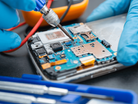Orange: The Radical Route to Refurbish Mobile Technology

With ongoing concerns surrounding e-waste and sustainability, the European mobile phone industry is pursuing greener manufacturing methods.
Leading this transformation is Dipli, the French company that seeks to streamline the product life cycle of electronic devices.
In partnership with IPSOS, Dipli conducted an extensive study exploring consumer attitudes about selling old phones and the appeal of purchasing refurbished devices.
The results highlight substantial growth potential within the refurbished market, signalling to electronics manufacturers that they can pursue greener methods while not compromising on profitability.
The imperative of managing E-Waste
With over eight billion mobile phones currently in use worldwide—surpassing the global population—Reynold underscores the pressing need for effective electronic waste management solutions.
This poses a major challenge for the mobile industry. The essential minerals used in phones, such as lithium and cobalt, are limited and must be carefully preserved.
Additionally, consumers often miss out on significant financial returns when upgrading without trading in their old devices.
For Dipli however, this challenge represents a significant growth opportunity. The company’s mission is to streamline the lifecycle of electronic devices by building an efficient supply chain that connects consumers looking to sell their used phones with those interested in purchasing refurbished models.
Through collaborations with major telecommunications providers and original equipment manufacturers (OEMs) like Orange, Dipli aims to elevate the second-hand market experience for end users.
"These eight billion devices are going to be renewed," says Reynold Simonnet, Co-Founder of Dipli, emphasising that this renewal presents a critical moment for intervention.
"If you miss this momentum, then basically the old phone is going to stay in the drawer forever."
Partnering to drive phone refurbishment & recycling
Orange has been a key partner for Dipli, implementing initiatives such as their "Re program" launched in October 2020.
This program allows consumers to trade in their old devices on the high street, at conveniently accessible retail locations.
Once collected, these devices are assessed and processed through Dipli’s supply chain, ensuring that they either undergo refurbishment or recycling.
"The trade-in and refurbished model is one of the best in Europe to meet customer needs: preventing lower planet impact while contributing to improve its purchasing power locally," says Sandrine André, EMEA Head of B2C Commercialisation at Orange.
IPSOS study Insights
A recent study conducted by IPSOS for Dipli highlights that a significant number of consumers have never sold their old smartphones, leaving many devices forgotten in drawers, gathering dust instead of being recycled or refurbished.
The research, which surveyed mobile users in France, Germany, and Poland, also indicates that people are purchasing new phones much less frequently than they did 15-20 years ago.
“When I started my career 15 years ago, people would buy a new phone every 18 months, then it was 24 months and now it's up to 36 months - it's always increasing,” explains Reynold.
“First you had then the original iPhone with a small memory, then Apple increased the memory, and then you had innovation like apps, then the camera, then 4G. This new stuff gave you this feeling that you have to change, because there was a fear of missing out.
“People are going through a kind of crisis in buying power. They have less money in their bank accounts since COVID-19 and now they're not willing to spend a thousand euro every 24 months on the phone.”
To manufacturers this should highlight the necessity of producing mobile products with long-term value, and offering refurbishment and recycling solutions as both these approaches grow more popular under current economic and environmental conditions.
How to encourage customers to buy second-hand
The IPSOS study reveals that trust is the key factor for consumers when it comes to purchasing second-hand phones.
Customers want assurance that their refurbished device functions properly and hasn't been tampered with. They also seek good value when buying new phones and selling their old ones, and they expect the entire process to be seamless.
Dipli aims to demonstrate that all of these expectations can be met.
One significant development that has encouraged more consumers to consider second-hand devices is the extended warranty period.
This insight has driven a shift in warranty offerings for refurbished devices. The sellers partnered with Dipli now typically offer two-year guarantees, a notable improvement from the previous standard of just six months.
This, Reynold believes, differentiates Dipli’s process from C2C sellers like Vinted, which expanded its marketplace recently to include electronic tech.
“you don't have the warranty there," he says. " You don't have the trust and you cannot make sure that the data is well wiped.
"We do however want to be sure that the experience that we are pushing to the customers is as close to Vinted as possible in terms of simplicity.”
The promise of radical refurbishment
The IPSOS study provides truly valuable insights into current consuming habits, highlighting the promise and profitability of refurbishing or recycling phones to manufacturers.
"This study shows that many opportunities are still ahead of us," says Orange’s Sandrine André.
“If you look at the carbon footprints, if you look at the water wastage, the way the materials are taken from the grounds using child labour. If you look at all of it, the manufacturing of the phones is quite devastating for human nature but also the environment.
“So, of course, the more we put back on the market, the less brand new phones we have to build.”
Refurbishment has radical promise for the future, creating a world where manufacturers can provide the telecommunications solutions we all need without compromising ethics or sustainability.
Make sure you check out the latest edition of Manufacturing Digital and also sign up to our global conference series - Manufacturing LIVE
Manufacturing Digital is a BizClik brand.
- o9 & Valeo Partner To Drive AI-Powered Smart MobilityAI & Automation
- Goodyear Works Towards 100% Sustainable Tyre MaterialSustainability & ESG
- Be.EV Sheffield Charging Hub Signals EV Manufacturing GrowthSustainability & ESG
- DHL Supply Chain & Diageo Drive Change with Hydrogen TrucksProcurement & Supply Chain


